|
|
1882 matching reports found. Showing 41 - 60 [TamilNet, Monday, 21 September 2015, 22:41 GMT]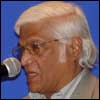 Internal investigations on violence against Tamils carried out by Commissions of Inquiry (CoI) with members appointed by Sri Lanka officials in the past have always been a failure. "The main reason for the failures can be traced to the absence of political will in successive Buddhist majority governments in ‘Sri Lanka’ to ensure accountability for grave violations of Human Rights of Tamil people," says K. Sivapalan, the exiled deputy chairperson of a Tamil rights group, North East Secretariat on Human Rights (NESoHR). Two of the commissions had “international” presence in 1963 and in 2006, in a hybrid context, but failed to deliver justice. As a lawyer who represented several victims from the Eastern Province, Mr Sivapalan says, for any criminal investigations to be successful, hearings of the courts will have to be held outside the island. Full story >> [TamilNet, Thursday, 10 September 2015, 05:47 GMT]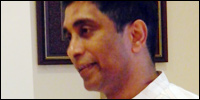 Colombo's LLRC was used by Washington as the basis for sponsoring the three UN resolutions on Sri Lanka in 2012, 2013 and 2014. Through sponsoring resolutions in the UNHRC, the USA has thrown away UN’s own Expert Panel Report as well as its Internal Review Panel Report, which pointed towards war crimes and crimes against humanity, says Professor Jude Lal in his second part of the interview to TamilNet. “In fact, it is the Expert Panel Report that recommended an international investigation. What has happened to these reports and their recommendations,” he asks adding that the same path will be adopted through the upcoming OISL report and the proposed domestic war crime investigation. Tamil people will have to carefully assess, which of the powers that they want to accuse as the primary international protagonists of the genocide, the exiled Sinhala academic says. Full story >> [TamilNet, Wednesday, 09 September 2015, 00:01 GMT]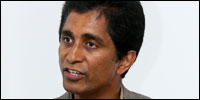 The SLFP/UPFA, UNP, JHU and the JVP have all claimed their share in the genocidal ‘military victory’ against the Tamils. The Sinhala liberal intelligentsia describes the trend as a ‘relay race’, where each Sinhala political leader had taken turns in contributing to the victory, says Professor Jude Lal of Trinity College, Dublin, in an interview to TamilNet on Tuesday. “There is an inherent racism within the so-called project of good governance, which is based on a victor’s mentality. The agenda of the ‘good governance’ did not arise from the Sinhala society. It was part of the US-sponsored UN resolution and a facade to cover up crimes committed against the Tamil people by the Sri Lankan state,” the exiled Sinhala academic says adding that the political power of the ‘Sinhala Supremacist State’ is at its peak at the moment. Full story >> [TamilNet, Friday, 31 July 2015, 12:57 GMT]The Turkish President Tayyip Erdogan has authorized the state armed forces to carry out air strikes against the Kurdistan Workers Party (PKK) and People’s Protection Units (YPG/YPJ) positions in Southern Turkey (Northern Kurdistan), North Iraq (Southern Kurdistan) and Northern Syria (West Kurdistan). On 23 July and 26 July, Turkish war planes pounded PKK bases in North Iraq and South-Eastern Turkey. Whereas Turkey claims to have launched attacks on the IS (Islamic State) in Syria, reports indicate that it is the PKK and YPG/YPJ who are the prime targets of the Turkish aggression. On 21st July a NATO Security Council meeting was called for by Turkey, and the Washington centred defence alliance granted its approval to its allies in Ankara, promising political support for Turkish military efforts. Consequently, on 29th July, the Turkish government annulled the ceasefire with the PKK. Full story >> [TamilNet, Monday, 19 January 2015, 23:49 GMT]The District Organiser of the United National Party (UNP) in Batticaloa Mr Arasaretnam Sasitharan said that a resolution has been passed at the UNP Batticaloa District Executive Committee to the effect that anti-people elements and former paramilitary operatives, who were deployed under the Mahinda Rajapaksa regime, should not be absorbed into the UNP or the polity associated with the UNP in the new regime in Colombo. The resolution has named four persons who should be kept away from the politics of Maithiripala Sirisena and Ranil Wickramaisnge if UNP needs to win credibility among the Tamil public in Batticaloa district, Mr Sasitharan further said. Full story >> [TamilNet, Tuesday, 13 January 2015, 23:22 GMT]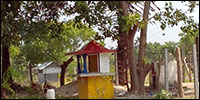 Governments may come and go, but the State of Sri Lanka gets strengthened in its genocidal project whether there is war, peace or talk of ‘change’, comment the resettled women of Mu'raa-oadai village, situated 5 km south of Vaazhaich-cheanai town in Batticaloa district. 400 houses have been destroyed. Two temples are damaged. Almost all the resettled families are women-headed households, poorest of the poor. The women of the village say: “It is only when we have permanent security from future genocide, we can breath the air of freedom.” The SL military has vacated last year from the village. But, a Buddhist statue and a ‘sacred’ Bo tree are still threatening the villagers who are haunted by the mere existence of the symbols of structural genocide. Full story >> [TamilNet, Thursday, 18 December 2014, 18:55 GMT]The global and regional powers locked in a geopolitical gambling have brought a contest between Mahinda Rajapaksa and Maithiripala Sirisena. Rajapaksa is backed by China while the West and possibly India back Rajapaksa's former associate Sirisena, said Gajendrakumar Ponnambalam, the leader of Tamil National Peoples Front (TNPF) on Thursday. Declared that there is no use for Tamil people by going behind any of the two mainstream candidates of the South in the upcoming Sri Lankan presidential election, the former Tamil parliamentarian, who addressed the press on behalf of the TNPF and the All Ceylon Tamil Congress, urged the Tamil people to refrain from backing any of the two candidates. The TNPF leader blamed the TNA for betraying the Tamil people for the second time as it did by backing Sarath Fonseka in 2010. Full story >> [TamilNet, Saturday, 29 November 2014, 09:09 GMT]“The material force and the historical significance of the liberation struggle for [Tamil] Eelam, battled by the LTTE provided a counter-hegemonic source for all oppressed people to organize a sovereign and people-centered and highly effective liberation struggle, to the dismay of international and regional establishments,” writes Norway-based Anthropology academic Athithan Jayapalan, in an article on the role of national narratives of liberation and culture for the oppressed. “The destruction of the LTTE was a loss for oppressed people across the world and for people of South Asia in particular,” he writes. Full story >> [TamilNet, Monday, 03 November 2014, 23:43 GMT] “While several actors including US, UK, China, UN involved in different ways in the conflict in Sri Lanka which led to genocide of Eelam Tamils, the actor most severely and the most consistently perplexed in the Sri Lankan war has been India,” says University of Bergen Research Fellow, Vijayshankar Asokan in a submission he sent on “Indian complicity in the genocide of Eezham Tamils” to OHCHR investigation on Sri Lanka. A native of Tamil Nadu and studying in Norway since 2008, Mr. Vijayshankar in his submission was extensively citing Mr. Ku. Ramakrishnan, General Secretary of Periyar Dravidar Kazhakam, Mr. Erik Solheim, the failed peace facilitator and various reports as well as statements. Full story >> [TamilNet, Thursday, 16 October 2014, 08:40 GMT]In a landmark victory for the legal initiatives of Eezham Tamils, the Court of Justice of the European Union has ordered the Council of European Union on Thursday to annul the restrictive measures taken against the Liberation Tigers of Tamil Eelam (LTTE). The case has been won by the LTTE on procedural grounds, said the lawyers representing the LTTE. Commenting on the judgement, Mr Lathan Suntharalingam, one of the initiators of the legal move against EU ban on LTTE said: “More than 40 countries in the world directly and indirectly abetted the Sri Lankan State in its genocidal onslaught on Eezham Tamils. The US paradigm of ‘War Against Terror’ was used to crush the LTTE-defended State of Eezham Tamils. The ECJ verdict on Thursday is a milestone achievement for Eezham Tamils in demanding global justice against the Tamil genocide.” Full story >> [TamilNet, Thursday, 10 July 2014, 23:24 GMT]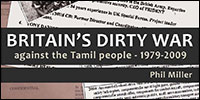 Phil Miller, a researcher for Corporate Watch in London, who gave expert evidence on ‘British State complicity in genocide of the Tamil people’ at the Permanent Peoples’ Tribunal on Sri Lanka (Bremen Session), has brought out an updated report titled “Britain's Dirty War against the Tamil people - 1979–2009” published by the International Human Rights Association Bremen. “This report draws on original research conducted at the UK National Archives and from Freedom of Information requests, as well as pooling together disparate information that is available in the public domain,” Phill Miller says in the preface. Dr N. Malathy, a key member of NESoHR and author of ‘A Fleeting Moment in my Country’, who survived the genocidal onslaught on Vanni, introduces the report by Philip Miller to TamilNet readers. Full story >> [TamilNet, Thursday, 26 June 2014, 23:28 GMT]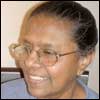 The progress in women security achieved through liberation movements in Asia are more substantive than any that was achieved or could be achieved by the campaigns of the West-activists. Yet, why do they ignore the former and focus only on the latter? Is it because it gives the West-activists and by implication those in the West in general the moral high ground to look down upon the “others”, asks Dr. N. Malathy, in an article sent to TamilNet. Discussing the topic through the Eezham Tamil case study, and comparing the West-activists’ campaign on child soldiers then and sexualised violence against women now, she is bringing out the duplicities and deficiencies inherent in the human rights campaigns run by West-activists. Full story >> [TamilNet, Sunday, 06 April 2014, 11:37 GMT] “Let us say you have one million Tamils in the Tamil diaspora. They used to collect money for the LTTE. They collected a lot of money. Let me put it in very plain simple terms: these one million work on the media of the world and make the story better known,” said 84-year old Peace Studies Professor Johan Galtung, in an interview to TamilNet-Palaka'ni last month. Acknowledging that the Eezham Tamils face genocide and structural genocide, identifying the Mahavamsa mentality in the Sinhala-Buddhists as the impediment for solutions, and at the same time blaming the armed struggle of the LTTE as a mistake, Galtung stood by “federation with a high level of autonomy,” which he had advocated and failed during his 34 visits to the island at the time of the peace talks. Full story >> [TamilNet, Saturday, 22 February 2014, 23:12 GMT]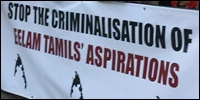 Tamil activists in UK gathered at 10 Downing Street, London, on Friday condemning Britain’s lead role in the suppression of independent Tamil political opinion, both before and after Sri Lanka’s genocidal onslaught in 2009. While the UK itself has stated that the LTTE is defunct for the past 5 years, it continues to justify the ban on the Tamil movement, still criminalising all the individuals who were associated with the armed struggle in the past, the protesters said. In the meantime, young Tamil activists who took part in the protest were of the opinion that the fight against the injustice of the past, especially the political struggle against EU ban on the LTTE, an act that enabled the Sri Lankan State to end the peace process in a genocidal onslaught, was a crucial component of the Tamil struggle. Full story >> [TamilNet, Monday, 20 January 2014, 00:05 GMT] Commenting on the Genocide Discussion held at the United Nations on the 15th January, where the Deputy Secretary-General Jan Eliasson discussed strategies to heed to early warning of mass atrocities, Professor Boyle, an expert in International Law, said, "[w]hat is needed now is for the United Nations to establish an outside Independent Commission of Investigation of distinguished experts along the lines of the Rwanda Commission with a mandate to investigate the entirety of GOSL atrocities against the Tamils. Only then might the United Nations atone for its Mortal Sins against the Tamils." The U.N., which withheld information on Sri Lanka's killings, and refused to take up Sri Lanka in the Security Council during the Mu'l'livaaykkaal killings, continued to avoid mentioning Sri Lanka, even while it touted "Rights Up Front" doctrine modeled after Sri Lanka massacres. Full story >> [TamilNet, Wednesday, 15 January 2014, 15:55 GMT]United States Pacific Command (USPACOM) advised the Sri Lankan Defence Establishment to purchase Cluster Bomb Units (CBUs) during the peace talks mediated by Norway in 2002. The Island paper, which gives media space for PSYOP and information war waged by the SL military Establishment, on Monday released portions of an alleged FOUO-classified document of the US Defence Establishment. The ‘leak’ was made to remind the US Ambassador-at-Large for War Crimes Issues Stephen J. Rapp, that Colombo was having proofs of ‘US complicity’ in the genocidal onslaught it waged on Eezham Tamils, an informed journalist from South told TamilNet. Colombo’s Defence Secretary Gotabhaya Rajapaksa himself timed the ‘leak’, the journalist further said. Full story >> [TamilNet, Friday, 03 January 2014, 23:40 GMT]The occupying Sri Lankan military wants to change the name of the Elephant Pass (EPS) Railway Station, being constructed with Indian assistance, to the name of a war-dead 25-year-old Sinhala soldier Lance Corporal Gamini Kularatne, who died after tossing two grenades into the first LTTE-made bulldozer tank in 1991 in the first battle of EPS Base. The destroyed railway track, which was being extended from Vavuniyaa to Ki’linochchi last year, has now reached Ezhuthumadduvaa’l. Full story >> [TamilNet, Sunday, 15 December 2013, 23:12 GMT]Colombo has schemed a sinister move to demographically annex Thennai-maravadi, a strategic ancient Tamil village in Kuchchave’li division on the border of Northern and Eastern Provinces with the Sinhala dominated Padavi Sripura division of Trincomalee district, civil sources in Trincomalee told TamilNet. By annexing Thennai-maravadi to Padavi-Sripura, all the administrative affairs of the village would be taken over by the Sinhala officials. This will make it easier for Colombo to carry out the Sinhalicisation of the entire area, Tamil officials in Kuchchave’li Divisional Secretariat said. The lands belonging to Tamils will be seized and handed over to Sinhalese settlers with the aim of permanently wedging the demographic contiguity of the northern and eastern provinces. Full story >> [TamilNet, Monday, 28 October 2013, 20:08 GMT]Seven Tamil farmers were seriously injured Monday evening when Sinhala encroachers, accompanied by Sinhala paramilitary known as ‘home guards’ attacked them using axes and swords at Padu-kaadu in Kangkuveali of Moothoor division of Trincomalee district. The wounded victims were rushed to Moothoor hospital. Four of the victims have been admitted to the emergency ward, according to medical sources at Moothoor hospital. Sinhala paramilitary men, who attacked the uprooted Tamils, have come from Deyyata village. The brutal attack took place when the uprooted Tamil farmers were preparing to resume agriculture at their 900 acres of paddy land after securing permission from the divisional secretary and the SL police to engage in farming. Full story >> [TamilNet, Sunday, 01 September 2013, 23:21 GMT]While the UN Security Council is the most decisive political organ, why did the US chose to move the UN Human Rights Commission and that too avoiding any reference to UN's own Expert Panel report, questions Dr. Jude Lal Fernando, one of the organizers of the Peoples' Tribunal on Sri Lanka held in Dublin in 2010, explaining the ‘tension’ found within the UN human rights and humanitarian system. Observing two reactions by the UN system, he also details how the casualty figures were intentionally withheld by major powers during war to let the SL State to complete its genocidal onslaught. Even now, the powers sitting on the issue at the UN are exerting political pressure on the system to control and to ‘interpret’ the vast pool of evidence that is against the SL State as well as themselves, Dr Fernando said in a video interview to TamilNet on Saturday. Full story >>
|
|
















